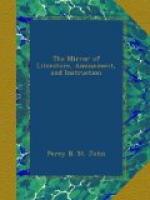THE PAST.
This common field, this little brook—
What is there hidden in these
two,
That I so often on them look,
Oftener than on the heavens
blue?
No beauty lies upon the field;
Small music doth the river yield;
And yet I look and look again,
With something of a pleasant pain.
’Tis thirty—can’t
be thirty years,
Since last I stood upon this
plank.
Which o’er the brook its figure
rears,
And watch’d the pebbles
as they sank?
How white the stream! I still remember
Its margin glassed by hoar December,
And how the sun fell on the snow:
Ah! can it be so long ago?
It cometh back;—so blithe,
so bright,
It hurries to my eager ken.
As though but one short winter’s
night
Had darkened o’er the
world since then.
It is the same clear dazzling scene;—
Perhaps the grass is scarce as green;
Perhaps the river’s troubled voice
Doth not so plainly say—“Rejoice.”
Yet Nature surely never ranges,
Ne’er quits her gay
and flowery crown;—
But, ever joyful, merely changes
The primrose for the thistle-down.
’Tis we alone who, waxing
old,
Look on her with an aspect cold,
Dissolve her in our burning tears,
Or clothe her with the mists of years!
Then, why should not the grass be green?
And why should not the river’s
song
Be merry,—as they both have
been
When I was here an urchin
strong?
Ah, true—too true! I see
the sun
Through thirty winter years hath run.
For grave eyes, mirrored in the brook,
Usurp the urchin’s laughing look!
So be it! I have lost,—and
won!
For, once, the past was poor
to me,—
The future dim: and though the sun
Shed life and strength, and
I was free,
I felt not—knew
no grateful pleasure:
All seemed but as the common measure:
But NOW—the experienced spirit
old
Turns all the leaden past to gold.
* * * * *
FRENCH MANNERS.
(The Duchess of Abrantes, in her recently published Memoirs, gives a striking picture of the difference in the fashions and habits of living which has resulted from the old French Revolution.)
Transported from Corsica to Paris at the close of the reign of Louis XV., my mother had imbibed a second nature in the midst of the luxuries and excellencies of that period. We flatter ourselves that we have gained much by our changes in that particular; but we are quite wrong. Forty thousand livres a-year fifty years ago, would have commanded more luxury than two hundred thousand now. The elegancies that at that period surrounded a woman of fashion cannot be numbered; a profusion of luxuries were in common use, of which even the name is now forgotten.




